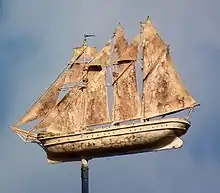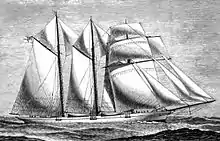HMS Waterwitch (1892)
HMS Waterwitch was a British hydrographic survey vessel active in eastern Asian waters from 1894 to 1912. She was a wooden vessel, purchased from a private owner specifically for survey work. She was lost in a collision in Singapore harbour in 1912.
.jpg.webp) HMS Waterwitch in 1897 | |
| History | |
|---|---|
| United Kingdom | |
| Name: | Lancashire Witch |
| Owner: | Sir Thomas Hesketh[Note 1] |
| Port of registry: | Liverpool, UK |
| Builder: | Robert Steele & Company, Cartsburn |
| Yard number: | 107 |
| Launched: | 29 August 1878 |
| Identification: |
|
| Fate: | Sold to the Admiralty |
| Name: | HMS Waterwitch |
| Acquired: | Purchased 17 March 1893[2] |
| Fate: | Sank in collision at Singapore, 1 September 1912 |
| General characteristics as Lancashire Witch[1] | |
| Type: | Yacht |
| Displacement: | |
| Tons burthen: | 479 Thames Measurement |
| Length: | 160.2 ft (48.8 m) |
| Beam: | 160.2 ft (48.8 m) |
| Depth of hold: | 14 ft (4.3 m) |
| Installed power: | 75 hp (56 kW) |
| Propulsion: |
|
| Sail plan: | Barquentine rigged |
| General characteristics as HMS Waterwitch | |
| Type: | Sloop/survey vessel |
| Installed power: | 450 hp (340 kW)[3] |
| Complement: | 81 |
Construction and acquisition
She was built as a private vessel, Lancashire Witch in 1878 by R. Steel & Co of Greenock to a design by St Clare John Byrne for the owner, Sir Thomas George Fermor-Hesketh, 7th Baronet. She was of composite construction, meaning she was built with an iron keel, stem and stern posts, and iron framing, all planked with wooden planking. She was rigged as a three-masted schooner, with square-rigged sails on the foremast only (a "barquentine" rig). A two-cylinder compound inverted steam engine of 75 hp (56 kW) drove a single screw. She was described in Lloyd's Yacht Register as an "auxiliary screw steamer".[1]
 Lancashire Witch approximately 1890
Lancashire Witch approximately 1890 Lancashire Witch wind vane on Frank James Hospital, East Cowes, IoW
Lancashire Witch wind vane on Frank James Hospital, East Cowes, IoW Lancashire Witch's "sister" Sunbeam under full sail.
Lancashire Witch's "sister" Sunbeam under full sail.
Career
Private yacht
In 1879 Sir Thomas Hesketh made a world cruise in Lancashire Witch,[4] visiting Alaska in 1880. An island in Kachemac Bay, Cook Inlet was named after Sir Thomas and rocks were named Lancashire Rocks after the yacht.[5]
There were a further 3 owners[Note 1] between 1883 and 1892 including Frank Linsly James, and on 17 March 1893 she was sold to the British Admiralty. She was renamed Waterwitch and rated as a sloop for survey work.
Royal Navy survey vessel

Waterwitch was converted for use as a survey vessel, which included replacing her engine and boilers to provide 450 horsepower. She commissioned in 1894 for service on the Australia Station,[6] undertaking a series of surveys on passage to the Cape of Good Hope. Once on station she made lines of soundings in Esperance Bay, Fiji and the Tasman Peninsula in preparation for the running of telegraph cables.[7] Between 1898 and 1907 she worked the coast of China, including Hong Kong, Weihaiwei and the Yangtze River. In early 1900 Commander Willoughby Pudsey Dawson was in command,[8] succeeded by Lieutenant W. O. Lyne when she was re-commissioned on 16 February 1900.[9] She formed part of the British naval contingent involved in relieving the Peking legations during the Boxer Rebellion in 1900 and surveyed the north channel of the Yangtze prior to the battleship Centurion's navigation of the river.[10] In 1902 Lieutenant and Commander Ernest Clifford Hardy was in command,[11] and she was in Hong Kong in October that year.[12]
Socotra Rock was surveyed by Waterwitch confirming a depth of less than 18 ft (5.5 m),[13] and she met severe gales in the Formosa Channel in 1903, and lost three men overboard. In 1906 she escaped being driven ashore in Chauan Bay by weighing anchor and steaming to safety in the calm of the storm-centre as it passed over.[14] In 1908, under Lieutenant Percy Douglas, she surveyed around Singapore and Klang,[15] with work in this area continuing under other commanding officers until her fatal accident in 1912.[16]
Loss
H.M.S. Waterwitch, the Admiralty survey ship … was sunk in the harbour yesterday in extraordinary circumstances. She was rammed amidships by the Colonial yacht Seamew, commanded by Captain Chamberlain, and went down before she could be beached at a convenient spot
— The Straits Times, 2 September 1912
_wrecked.jpg.webp)
On 1 September 1912, while lying at anchor off the north-eastern end of the mole at Singapore Harbour, Waterwitch was struck amidships by Seamew, the personal launch of the Governor of Singapore. Seamew had been heading around the breakwater for her usual berth and paid little enough attention to the position of Waterwitch that she drove right at her. The launch's sharp prow pierced Waterwitch's wooden side, and she then compounded her error by putting her engines hard astern. Waterwitch's bridge collapsed, her mainmast fell over the port side, and the resulting gaping wound in her side allowed an overpowering in-rush of water.[17]
Since her fires were out,[18] no power could be raised, and so her anchor watch manned the pumps and a tug took her in tow. The wash from the tug increased the flooding and Waterwitch sank in 24 ft (7.3 m) of water. At low water, her masts, funnel, and the highest parts of her superstructure remained above water. Two members of her ship's company were drowned: Marine Sturgess knocked himself out diving overboard and was drowned, and an unnamed Chinese boy drowned between decks.[19] A Board of Trade inquiry was held at Singapore from 20 to 23 September 1912 and found that the collision was due to the negligence of Seamew's captain and, to a lesser degree, her First Officer and Chief Engineer.[20] At a re-opened inquiry the following month, the two subordinate officers were exonerated.[21]
The wreck was raised on 10 September 1912 and taken to drydock at Tanjong Pagar.[22] On 12 October 1912 Waterwitch was offered for sale "as lies" in drydock.[23]
Return to service
The purchaser of Waterwitch, local Italian businessman Captain Giovanni Gaggino, ordered her refit at Tanjong Pagar as a private yacht.[24] Renamed Fata Morgana, the yacht departed Singapore for the South Seas in early January 1914.[25] Captain Gaggino died at Batavia, Dutch East Indies in February 1918.[26]
Myth of the White Ladye
There are references indicating that HMS Waterwitch was formally White Ladye, at one time owned by actress Lillie Langtry. However, there is an audit trail from Lloyd's Yacht Register for the White Ladye showing that she was in private hands from the day she was built to when she was dismantled in 1935 and this is supported by contemporary newspaper articles.[27][28]
Notes
- Later owners were: William Houldsworth (1883–83), Frank Linsly James (1887–88) and William James (1891–92)
References
- Lloyd's Yacht Register, 1889/90, p.229
- Colledge, J. J.; Warlow, Ben (2006) [1969]. Ships of the Royal Navy: The Complete Record of all Fighting Ships of the Royal Navy (Rev. ed.). London: Chatham Publishing. ISBN 978-1-86176-281-8.
- "The Navy List of 1908 at Battleships-Cruisers website". Archived from the original on 21 October 2006. Retrieved 4 October 2008.
- Francis Francis (the younger.) (1881). War, waves, and wanderings, a cruise in the 'Lancashire witch'. Archived from the original on 13 March 2016. Retrieved 8 April 2013.
- Baker, Marcus (1992). Geographic Dictionary of Alaska. Washington: Government Printing Office. p. 261.
- Bastock, p.125.
- Day (1967), p.128
- "Naval & Military intelligence". The Times (36055). London. 2 February 1900. p. 10.
- "Naval & Military intelligence". The Times (36069). London. 19 February 1900. p. 9.
- Day (1967), pp. 128–129 & 187.
- "Naval & Military intelligence". The Times (36796). London. 17 June 1902. p. 7.
- "Naval & Military intelligence". The Times (36898). London. 14 October 1902. p. 7.
- United Kingdom Hydrographic Office – Survey number B7973 (Eh) "Socotra Rock, Found by HMS Waterwitch, August 1901"
- Day (1967), p. 205 & 241
- Day (1967), pp. 244–246
- Day (1967), pp. 280–284
- The Straits Times, 2 September 1912
- "Hansard, 28 October 1912, Written Answers (House of Commons)". Archived from the original on 15 July 2009. Retrieved 4 October 2008.
- Howe, Robert (6 July 2004). "A shipwreck in Singapore and the Jersey Lily". Gibbons Stamp Monthly (online edition). Archived from the original on 27 September 2007. Retrieved 23 September 2006.
- "The Waterwitch Enquiry". The Straits Times. Singapore. 24 September 1912. p. 7. Archived from the original on 14 September 2018. Retrieved 14 September 2018.
- "Waterwitch Enquiry". The Singapore Free Press and Mercantile Advertiser. 26 October 1912. p. 5. Archived from the original on 14 September 2018. Retrieved 14 September 2018.
- "Waterwitch Successfully Floated". The Straits Times. Singapore. 10 September 1912. p. 6. Archived from the original on 14 September 2018. Retrieved 14 September 2018.
- "HMS "Waterwitch"". The Singapore Free Press and Mercantile Advertiser. 12 October 1912. p. 8. Archived from the original on 14 September 2018. Retrieved 14 September 2018.
- "Shipping Notes". The Singapore Free Press and Mercantile Advertiser. 12 November 1912. p. 12. Archived from the original on 14 September 2018. Retrieved 14 September 2018.
- "Departures". The Straits Times. Singapore. 5 January 1914. p. 7. Archived from the original on 14 September 2018. Retrieved 14 September 2018.
- "The Late Capt. Gaggino". Malaya Tribune. Singapore. 14 February 1918. p. 4. Archived from the original on 14 September 2018. Retrieved 14 September 2018.
- "Mrs Lantry's Yacht Sold" (PDF). The New York Times. 25 November 1897. Retrieved 16 January 2013.
- "Mr Goelet Charters White Ladye" (PDF). The New York Times. 14 July 1893. Retrieved 16 January 2013.
- Bastock, John (1988), Ships on the Australia Station, Child & Associates Publishing Pty Ltd; Frenchs Forest, Australia. ISBN 0-86777-348-0
- Sir Archibald Day; Great Britain. Ministry of Defence (1967). The Admiralty Hydrographic Service, 1795–1919. H.M. Stationery Office. Retrieved 6 April 2013.
External links
| Wikimedia Commons has media related to HMS Waterwitch (ship, 1878). |